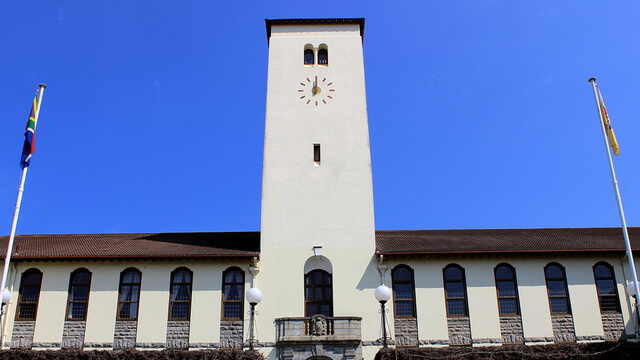
On Monday, 23 March 2020, President Cyril Ramaphosa addressed the nation on further measures that the National Coronavirus Command Council had decide on to reduce the overall number of coronavirus (COVID-19) infections and to delay the spread of infection over a longer period. He pointed out that, given the rate of transmission and spread of the virus, “a swift and extraordinary action is required if we are to prevent a human catastrophe of enormous proportions in our country.”
He said that the National Coronavirus Command Council had decided to impose a nationwide lockdown for 21 days from midnight on 26 March 2020 to 16 April 2020 in an effort to slow the rapid spread of the coronavirus (COVID-19).
We fully support President Ramaphosa on the measures he has taken to reduce the rate of transmission and spread of the virus and commend him for the strong and decisive leadership he has provided our nation in these challenging and unprecedented times.
We hereby advise all Rhodes University staff and students to abide by the conditions of the nationwide lockdown by staying at home, avoiding public places and cancelling all social and cultural activities. We must do this, not so much out of fear of law enforcement agencies, but out of civic duty and care for the safety, wellbeing and health of our fellow citizens. We should do so in order to avert a human catastrophe. We should do so “to save millions of South Africans from infection and save the lives of thousands of people,” as the President stated.
What does LOCKDOWN mean for me? Fast facts for all staff
What the LOCKDOWN is
- The LOCKDOWN is a critical stage in the national effort to flatten the rising curve in the growth of Coronavirus COVID-19 infections in the country.
- It is about limiting average daily contact between people, including at the workplace.
- It is about individual discipline and responsibility to self-isolate.
- The University has accordingly suspended all affected contact operations and encourages all staff to observe the national guidelines by limiting contact.
What the LOCKDOWN is not
- The LOCKDOWN is not a holiday.
- The LOCKDOWN is not an opportunity to travel or to visit friends and to socialise.
- The LOCKDOWN is not a 21-day solution to the COVID-19 pandemic. We will all need to use this period to ready ourselves for a different style of post-lockdown academic programme.
What is affected by the LOCKDOWN?
All on-campus operations are affected. Representations will be made through Universities South Africa (USAf) for the accreditation of designated functions also known as “Critical Functions”. These are:
- Healthcare Centre.
- Information and Communication Technology services.
- Finance and Payroll.
- Campus Protection services.
- Defined research projects (including animal, insect and plant experiments that HAVE to continue, forms of biological laboratory stock that HAS to be kept alive during the lockdown period, including cell cultures and the monitoring of fridge and freezer stocks).
- Specific communication services and staff.
- Educational technology specialists.
- Emergency maintenance staff (including technical services staff in departments who might need to see to specialised equipment).
What are the applicable conditions to the functions listed above?
In all exempted cases, social distancing and health standards MUST be strictly observed.
What is the implication of this situation on staff leave?
Clarity in this regard will be provided in due course in line with the national position to be communicated by the Ministry of Employment and Labour.
How will plans for alternative modalities and platforms to Teaching & Learning be pursued during the LOCKDOWN period?
- The Deputy Vice-Chancellor: Academic and Students Affairs (DVC: A&SA) will facilitate ongoing discussions around the activation and implementation of alternative teaching and learning platforms.
- Discussions on the zero-rating of access to the ac.za domain is being taken up at national level.
How will research continuity be affected by the LOCKDOWN?
- Online mechanisms for supervision engagements and Centre for Postgraduate Studies workshops are in place.
- The Deputy Vice-Chancellor: Research and Innovation (DVC: R&I) will be constantly on hand to resolve bottlenecks to continued productivity.
- All online Library information resources will be available for access during this time.
What will happen where statutory/other reports are due?
- Where funder’s reports are required, DVC: R&I will seek to negotiate for flexibility in the application of deadlines that cannot be met.
- USAf will be engaging the Department of Higher Education and Training to negotiate flexibility in the application of regulations regarding statutory reports.
Are there still students at Residences?
- There are 12 undergraduate students on campus who were granted approval to stay.
- There are 53 postgraduates students, comprising 27 South Africans, and 26 international students.
- The students will be advised to leave.
- Embassies or Consulates will be informed and asked to assist all international students.
Institution to Government collaboration: What role might Rhodes University contribute?
- Rhodes University will fully cooperate with and actively support all government efforts to deal with the COVID-19 pandemic.
- A joint action plan between the University and the Province is being finalised following a meeting of stakeholders yesterday.
The University appreciates the fact that no intervention is without disadvantages. All interventions are evaluated based on the University’s commitment to the national cause and based on an assessment of their pros and cons.
The President called on organisations that are able to continue their operations remotely to do so. Our University is one of those.
This is our University, and we all need to do what we can as a University community so that when the lockdown is over and the coronavirus defeated, we have a healthy institution to return to. All staff who can work remotely are strongly encouraged to do so. This is important to ensure that our University remains ready for the post-coronavirus era.
